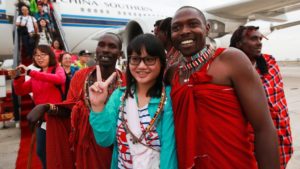
(EPA/Daniel Irungu)
The online Chinese-Kiswahili dictionary, Siwaxili, is full of useful phrases translated into both languages. Some are general: “My car is broken. Can you help me?” or “I will pay you later.” Others are more literary: “I will tell you a story.” And some are oddly specific: “One is already married. The other is still quite young.”
Siwaxili, the transliteration for Kiswahili in Mandarin, is the first comprehensive online dictionary. Few other Chinese-Kiswahili dictionaries exist. China’s ministry of education published a dictionary in 2013. Before that, the last version was in 1971. The Siwaxili online dictionary has about 14,000 dictionary entries, or lemmata, according to its creator, Yuning Shen, a lexicographer studying African linguistics at the University of Hamburg where he is finishing a master’s degree. He has been working on the project from Germany, Tanzania, and Kenya since 2012.
“I get the feeling that more and more Chinese share the same view with Nelson Mandela—’If you talk to a man in a language he understands, that goes to his head. If you talk to him in his language, that goes to his heart,’” he says.
While living in Tanzania and Kenya, Shen noticed interest among his fellow Chinese in learning Kiswahili but a lack of teaching material and teachers with experience teaching Mandarin speakers. Tanzania and Kenya, where Kiswahili is a national language, are both home to growing Chinese communities as more Chinese companies win bids to build infrastructure projects and Chinese entrepreneurs and traders come seeking new business opportunities.
The dictionary is meant to cover the gamut of words and phrases that Chinese and Kiswahili speakers might use in China or in eastern and central Africa. Since releasing an initial version online in 2014, Shen has been updating it every month with new words and phrases gleaned from newspapers, literature, his own interactions with Kiswahili speakers, and most recently searches made on the Siwaxili site. Later this year, he is releasing a Siwaxili app.
Read more here.


